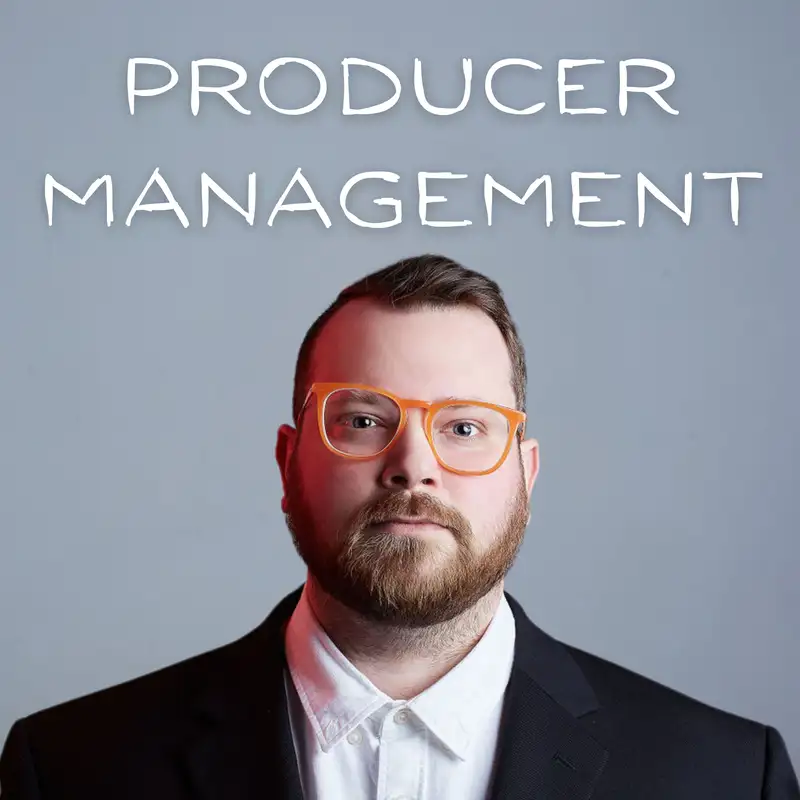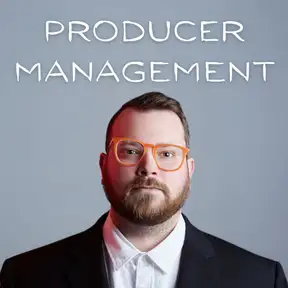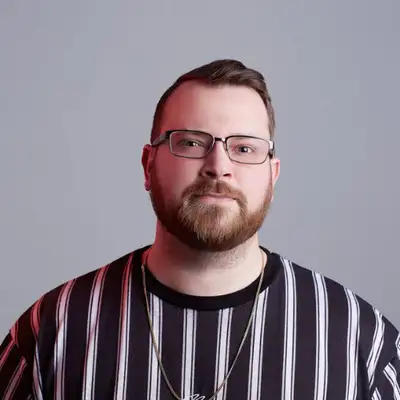
How Stress-Free Producers Make Decisions
It's not like a yes, no, right, wrong. It's comes down to setting rules in your business based on what I need now will determine the priority between control and the stuff that will grow the future. Yeah.
I would just start with a goal. That makes sense. Hey everyone, Daniel Grimmett here.
You're listening to producer management, the podcast that lets you in on real conversations between professional music producers and their teams, the deals, the strategies, and the unfiltered advice. This show is brought to you by my company, dark label music. When producers want clarity strategy and growth, they call us.
We're hired as a strategic partner, part management, part creative and business development designed for the realities of being a music producer right now. So whether you're a small studio or a Grammy winning veteran, reach out to us at dark label, music.com to see if we can help. The majority of my workday is spent helping music producers with their decision making.
I would say that's the most important thing that we do here at dark label. And the reason that we spend so much time on this is because the outcomes that we experience, whether it be success or failure are determined by the decisions that we make. And the biggest gift that I could ever give to a music producer wouldn't be a strategy or a paid opportunity or a connection.
The biggest gift that I could give them is the ability to make calculated decisions, see them through and quickly make adjustments when needed. Without that ability, what tends to happen is that producers get pulled in a bunch of different directions. And despite things going well on the surface, they perpetually feel overwhelmed, uncertain and spread too thin.
And then the majority of their time is spent thinking instead of doing or creating, which in my opinion is one of the leading causes of career anxiety for music producers. So I want to show you what this looks like in real life. I'm going to play you a six minute clip of a conversation between my business partner, myself and a producer that we had just started working with at the time.
And you'll hear this producer trying to sort out everything in his head by thinking out loud. And then you'll see how we respond and the advice that we give them. And I'll jump back in after the clip to give you some more context and updates as to what happened.
Here's the clip...
Right now I'm in a place where I just booked actually a decent amount of work in this past week coming up for this month and such and enough of it paid up front that I know I'm going to be okay for this coming month. And obviously my main priority still is on like building clients and repeat, you know, repeat business, sort of a momentum type situation so that I don't have to be consistently, you guys already know, just like that.
That's sort of my main priority at the moment. Um, but I also have an offer from or like the sample pack company to do a pack for the, or to potentially do multiple packs for them. And they offered essentially a 40% split for that sample pack.
So my initial thought was, you know, my I'm weighing the options between taking the 40% split, uh, just so that I have a sample pack with an established brand that also becomes an asset, starts to bring in more money, and then use that as leverage in the future in order to build, um, in order to, you know, build a sample pack company, maybe 12 months, 18 months down the road when I have a sample pack, when I have the cosine of having, you know, done this, when it's essentially pretty easy for me to just, you know, post up for an hour in the mornings in the beginning of my day and just knock out three, three samples, four samples, something like that. And then chip away at this and over the course of a month or two, have a sample pack, drop it on the site. They sell for about 60 bucks, 70 bucks per sample pack.
Um, so I'm thinking to potentially, you know, incorporate that into my day, but I guess my, um, my question, again, it has to do with a little bit with priority and in your, you know, from your guy's perspective, would it make more sense to take the 40%? Would it make more sense to counter with, you know, a 50% split or a 60% split or something like that, even though they have sort of like the more established brand at the moment? Um, or would you say, don't even worry about that and find some other alternatives or just continue with the freelance vibe? Got it. Um, so basically it's a thing of prioritizing now money and, and future potential money, right? Exactly. And then the other, the other thing on my mind, besides just the money is what my long-term strategy is and how this plays into that and how I could leverage that in the future, because that's the other benefit I see to having a sample pack with them is just, it's something I could pretty easily do.
That is another big thing that, you know, I can announce and the people that are familiar with my work, it's just, you know what I mean? It's just another, it's just another stack. Yeah. It could be cool.
Whatever you think it's going to do for you, drop that to about 30%. Yeah, of course. Reality, you know, it's probably not going to do that much to grow your brand a little bit, but not probably what people think it is when they first get a deal like that, they're like, Oh man, that's good.
Unlock so many doors, bring that down to about 30%. And that's probably the reality of what you'll get from it. So we're going to open this up to a bigger, um, obviously you just jumped into dark label, so we haven't had our initial calls yet.
We haven't even talked at all yet. So, but what I would do moving forward is like 80% of your time needs to be building up the freelance stuff. Um, because, uh, that's your, that's your now money.
And yes, you got a nice, uh, little injection there from some stuff cause you went out and, and hustled. So we already got momentum there and let's, let's lock that in. If you want to keep 20% of your time to do some other things like that's fine, but you need to stick to it.
So that's, I don't know, maybe a half day a week then within that, but you may already have other shit going on. If you're developing some artists or you're working on something else, you gotta keep that in consideration. This is really just comes down to, it's not like a yes, no, right, wrong.
It's comes down to setting rules in your business of based on what I need now will determine the priority between, you know, control and the stuff that will grow the future. That makes sense. I guess, um, I think, you know, cause like I said, I think I can, though the amount of work that would be required is probably about an hour in the morning.
Like three days a week. But alternatively, I guess, I guess the followup question would be, I also have a friend of mine who I've linked with, um, who's now on tour with a pretty sizable artist. And so I've also been sending them, uh, starters, um, knowing that they're going to be cooking songs for their next project as, as the tour progresses.
Would it be a higher leverage to spend that same three hours cooking for them when it's a personal connection like that could be something reputation builder versus like just some one-off sample pack company like this? Like if I was to spend like three hours a week, like making samples, do you think it would be a better investment of my time to do it for the sample pack company or for something that could lead to, you know, a song that, you know what I mean, like a bigger reputation builder. Aaron, you want to jump? Yeah. I would just start with a goal.
What do you want to do? Do you want to be working on bigger records and chasing that? Do you want to build a song on my company? They feel like quite separate goals to run on to initially. Bigger songs. That's it.
Okay. Man, you made it simple. Tell that you appreciate the offer and that you're open to it, but that you're, uh, it may be a couple, can we loop back around and talk about it in a couple of months? Okay.
Those companies are always looking for stuff. So, okay, cool. Yeah, that makes sense.
Okay. So that clip right there was a classic case of the, I could, I could do this, but I could also do that. What should I do? This will only get worse as you grow in your music career, because the bigger you get, the more opportunities you will have and the more decision-making you will have to do.
And as you just heard there, our approach to this situation is to a analyze each opportunity and paint a more realistic picture of the outcome. Most producers think every opportunity they get is going to be life-changing and statistically that is false. And in my experience, most of the actual life-changing opportunities, you don't really realize until afterwards anyway.
And B, the second thing we do is just bring them back to center and ensure that whatever decision they make is based on the goal that they're trying to achieve at that moment, instead of just randomly saying yes to everything without thinking it through. At the time of this clip, you just heard this producer was in a position where he just needed to focus on building a stable income stream so he could cover his living expenses first, and then he could go off and explore more opportunities that are a bit more speculative. Because if he's telling us that the most important thing for him right now is to make sure his bills are paid, yet the actions that he's taking on a day-to-day basis are not doing that, then he's just going to be in for a rough time.
And that is what most producers do. Their actions don't match their goals. That is another definition, I guess, of incorrect or bad decision-making.
Now I totally understand that the speculative work is way more sexy, right? Like getting on a big record, landing a sync placement, a partnership with a sample pack company, all of that. But those opportunities are not going anywhere. Labels will always need hit songs.
Movies will always need music. And sample pack companies will always need packs to sell. And by creating some stability and certainty for yourself first, most of the time our producers are doing that through building their own freelance business, their own brand, some income streams they control, by doing that first, you can navigate those bigger opportunities, the speculative opportunities, more rationally.
And this is how you can avoid signing really shitty deals. Most of the time when people sign bad deals, it's because they've put themselves in the position where they kind of have to sign whatever deal they get without it, they really don't have much going on. Now I'm not saying that this is the only way to build a career as a producer.
I know this sounds sometimes a little too boring and a little too safe. There are many different paths to build a career, but producers hire us because they want a sustainable career. So that is the lens at which we see everything through.
So you might be asking, well, what happened to the producer in that clip? At this point, we've been working with him for about 90 days and he did exactly what we told him to do. He has a very stable freelance business that generates more than what he needs to pay his bills without taking up all of his time, and now we are exploring how he wants to invest his extra time and money into building his future as a producer. That is good decision-making.
If you go to producermanagement.com, you'll find links to jump on our newsletter, which I highly recommend because it's the perfect companion to the show, and if you enjoy what we're doing here, please leave us a five-star review or share it with a friend. Thanks for listening. That's the episode.


